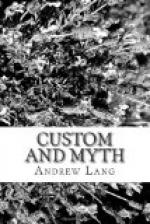Mr. Muller’s opinion is the very reverse: he believes that a contemplative and disinterested emotion in the presence of the Infinite, or of anything that suggests infinitude or is mistaken for the Infinite, begets human religion, while of this religion fetichism is a later corruption.
* * * * *
In treating of fetichism Mr. Muller is obliged to criticise the system of De Brosses, who introduced this rather unfortunate term to science, in an admirable work, ‘Le Culte des Dieux Fetiches’ (1760). We call the work ‘admirable,’ because, considering the contemporary state of knowledge and speculation, De Brosses’s book is brilliant, original, and only now and then rash or confused. Mr. Muller says that De Brosses ’holds that all nations had to begin with fetichism, to be followed afterwards by polytheism and monotheism.’ This sentence would lead some readers to suppose that De Brosses, in his speculations, was looking for the origin of religion; but, in reality, his work is a mere attempt to explain a certain element in ancient religion and mythology. De Brosses was well aware that heathen religions were a complex mass, a concretion of many materials. He admits the existence of regard for the spirits of the dead as one factor, he gives Sabaeism a place as another. But what chiefly puzzles him, and what he chiefly tries to explain, is the worship of odds and ends of rubbish, and the adoration of animals, mountains, trees, the sun, and so forth. When he masses all these worships together, and proposes to call them all Fetichism (a term derived from the Portuguese word for a talisman), De Brosses is distinctly unscientific. But De Brosses is distinctly scientific when he attempts to explain the animal-worship of Egypt, and the respect paid by Greeks and Romans to shapeless stones, as survivals of older savage practices.
The position of De Brosses is this: Old mythology and religion are a tissue of many threads. Sabaeism, adoration of the dead, mythopoeic fancy, have their part in the fabric. Among many African tribes, a form of theism, Islamite or Christian, or self-developed, is superimposed on a mass of earlier superstitions. Among these superstitions, is the worship of animals and plants, and the cult of rough stones and of odds and ends of matter. What is the origin of this element, so prominent in the religion of Egypt, and present, if less conspicuous, in the most ancient temples of Greece? It is the survival, answers De Brosses, of ancient practices like those of untutored peoples, as Brazilians, Samoyeds, Negroes, whom the Egyptians and Pelasgians once resembled in lack of culture.




